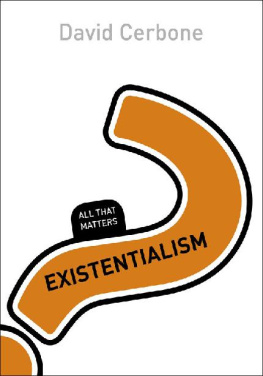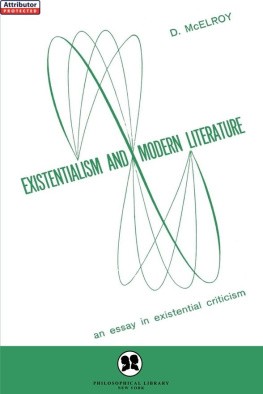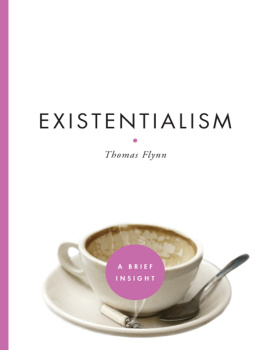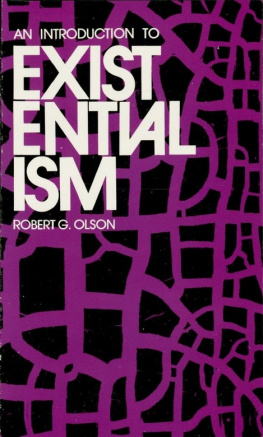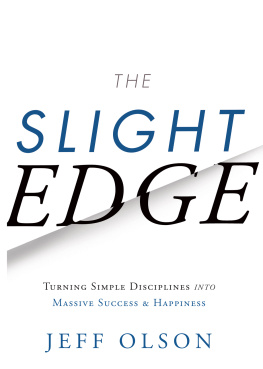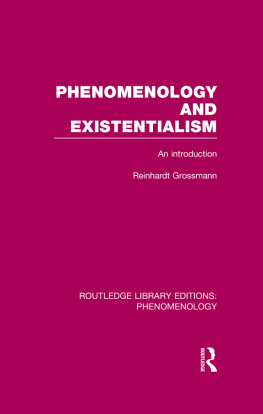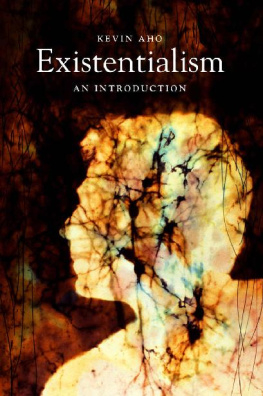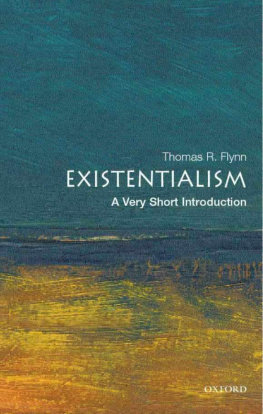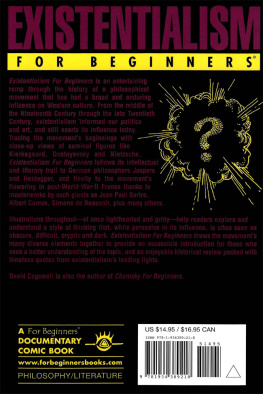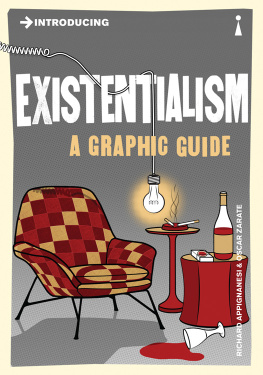EXISTENTIALISM David R. Cerbone |  |
David R. Cerbone is Professor of Philosophy at West Virginia University, where he teaches a regularly oversubscribed course on existentialism for undergraduates. He is the author of two books, Understanding Phenomenology (2006) and Heidegger: A Guide for the Perplexed (2008), and more than 30 articles and reviews on Heidegger and Wittgenstein, as well as the phenomenological and existentialist traditions more generally. He currently serves as one of the editors for the Routledge Research in Phenomenology series.
David lives with his wife and three children (along with two dogs, three cats, a rabbit and a guinea pig) in rural West Virginia. In addition to philosophy, his other passion is photography. His work can be seen at several galleries in West Virginia.
For the many students of Philosophy 355 (and Philosophy 121 before that) at WVU, who have over the years worked with me to discover what really matters in existentialism.
Contents
Prologue
Before his death, Rabbi Zusya said In the coming world, they will not ask me: Why were you not Moses? They will ask me: Why were you not Zusya?
The parable of Rabbi Zusyas judgment comes from the Hasidic tradition in Judaism. Rabbi Zusya of Hanipol was a Hasidic master or zaddik, and, as with other such masters, there are many legends and parables associated with him. The parable is recounted by Martin Buber in the first volume of his Tales of the Hasidim. In the Tales, the parable is entitled The Query of Queries, which gives some indication of its significance. Buber is an important 20th-century philosopher within Judaism, but his interests and significance extend beyond the Jewish tradition. His most famous work, I and Thou, is often ranked among works in the existentialist tradition, and so in citing this parable at the outset of this book, I am not roaming as far afield as it might appear.
There is something both familiar and paradoxical about Zusyas question. We are all conversant with expressions such as Just be yourself, Thats not who I really am, I was not myself yesterday, and so on, but if we try to dig down beneath these familiar expressions and statements, they become increasingly puzzling. After all, if Zusya is Zusya, how could he be, or even have been, anything else? We can readily understand how Zusya might have failed to do some particular thing or reach some particular goal. We can also readily understand how he might have failed to be more like someone else. But how could he have failed to be himself?
In The Ethics of Ambiguity, the existentialist philosopher and writer Simone de Beauvoir asserts that in the very condition of man there enters the possibility of not fulfilling this condition. This seems to accord with the reproach Zusya imagines awaiting him in the coming world. To fail to be Zusya is for Zusya to have failed to fulfil his condition. But what does that mean? Consider an acorn. An acorn has a very specific condition, which includes a very specific form of fulfilment: an acorn fulfils its condition by growing into a mighty oak. But as even a casual walk through the woods will reveal, most acorns do not grow into oak trees. Many if not most of the acorns strewn under and around their parent oak trees will be eaten by animals, wither or rot away, be crunched underfoot by hikers, and so on. So it would seem that in the very condition of acorns there lies the possibility of not fulfilling this condition. But if this is so, de Beauvoirs assertion becomes more puzzling in that it no longer appears to be marking out something about the human condition in particular or in contrast to the condition of other kinds of things.
To see that there might be something distinctive about the human condition in contrast to that of the acorn, notice first that the query of queries is not something acorns themselves ever ask. Though I might stand before the acorn lying fallow and ask, Why are you not a mighty oak?, it would be foolish to expect an answer. That Zusya raises the question about being Zusya for himself suggests that the issue of accountability or answerability arises for Zusya and the rest of us: we, unlike the acorn, have to answer for who we are or who we become. The question matters or can matter to us in a way that it doesnt for something like an acorn.
In the Introduction to the Tales, Buber contrasts the ideal pattern of the individual limned by the Creator, and what he actually is. When Zusya worries about the coming world, he is worried about how hell measure up to that ideal pattern. Further questions arise here: what is that ideal pattern and how is Zusya supposed to know what it is? That these questions arise here mark another difference between a human being and an acorn. It is pretty easy to say what an acorn is supposed to become: the ideal pattern for an acorn is growing into a mighty oak. The measure for acorns is thus readily available. But what is that measure when it comes to being human? What is it that any of us is supposed to be? Talk about an ideal pattern suggests an answer laid up somewhere, awaiting us in the coming world perhaps, but if it is that hidden, we can only feel anxious about it while we are living out our lives here and now. Acorns are not anxious about becoming oaks or not. They just fall to the ground and then either grow or do not.
The question of who we are supposed to be haunts us in a way that it doesnt for an acorn. It is a question for us to ponder, for us to ask of ourselves, but it is also an importantly different question. For us, the question is personal, whereas the question raised about the acorn is generic. Whatever the ideal pattern is for an acorn, it is one that pertains to all acorns in the same way: an acorn is supposed to become an oak tree, full stop. But Zusya worries that he will have failed to be Zusya, not just a full or complete human being (whatever that might be). In this way, the parable brings into view the particular kind of project that I see at the heart of existentialism: the project of becoming an individual. Sren Kierkegaard, a founding figure of existentialism, writes in the preface to The Sickness Unto Death of a kind of Christian heroism that involves risk[ing] unreservedly being oneself, an individual human being, this specific individual human being alone before God, alone in this enormous exertion and enormous accountability. The Christian hero feels a similar accountability and a similar risk of failure as Hasidisms Zusya. The question Kierkegaards remark raises, just as much as the parable of Zusya does, is one of how we are to understand this talk of enormous exertion. What exactly is difficult, what stands in the way of being this specific individual human being? Arent we each of us that already? What more do I have to do in order to be an individual beyond just being this person, numerically distinct from all others?
These sorts of questions will inform our exploration of the existentialist tradition in 19th- and 20th-century philosophy, as each of the figures considered Kierkegaard, Friedrich Nietzsche, Martin Heidegger, Jean-Paul Sartre, Albert Camus and Simone de Beauvoir offer related, though distinct, conceptions of the task of becoming an individual. In many ways, existentialisms concern with this task is no different from many earlier philosophical points of view. Existentialism is not discontinuous with the philosophical tradition out of which it emerges. At the same time, part of what is exciting about studying existentialism is the way it is also a radical critique of, and departure from, that prior tradition. Indeed, for existentialism, part of what stands in the way of our becoming individuals is our being bogged down with traditional assumptions and ideas (that there is an ideal pattern out there that we just need to figure out or discover might be one of them). We need to break free of tradition while at the same time preserving and transforming many of its core concerns. I will next sketch out in very distilled form a key existentialist insight or perspective in relation to these traditional assumptions and ideas. Making this kind of shift in perspective will give us the right point of view for appreciating the novelty of existentialisms concern with the possibility of each of us becoming this specific individual human being, nothing more, but also nothing less.
Next page

